"What would you say if I said I would
like to go to South Africa to help with the Mashudu
Project?"
Silence……and then came the
reply,
"Go for it!"
This was the start of a conversation
between Ken, my husband and I last Christmas. We had
recently heard about the Mashudu Project, which was set
up by Linda Mannas to resource the people of Tshakhuma
and the surrounding area in the Limpopo province of
South Africa. The people here are Venda and speak
Tshvenda, although many speak 3 or 4 languages including
English. The project was set up in 2000 and so far has
sent 29 volunteers out to share their skills and
time.
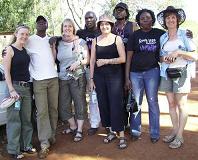 After helping me raise the flight fare
by completing the Hastings Half Marathon together Ken
eventually took us to Heathrow Airport on July
24th. We were a party of four, Linda, myself
and Helen and Jo, sisters from London. Helen and I are
teachers and Jo is a trainee physiotherapist, so the
plan was that Helen and I would work in local primary
schools with the staff and Jo would work in a boarding
school for children with physical disabilities. While
Linda co-ordinated all work undertaken.
After helping me raise the flight fare
by completing the Hastings Half Marathon together Ken
eventually took us to Heathrow Airport on July
24th. We were a party of four, Linda, myself
and Helen and Jo, sisters from London. Helen and I are
teachers and Jo is a trainee physiotherapist, so the
plan was that Helen and I would work in local primary
schools with the staff and Jo would work in a boarding
school for children with physical disabilities. While
Linda co-ordinated all work undertaken.
We arrived in Tshakhuma the
following evening after an eleven hour flight and 5 hour
drive. I was dropped off at Rosemary’s home, where I was
warmly welcomed by Rosemary, her daughter, two sons and
grandson. Expecting to rough it I was pleased to find a
comfortable brick-built 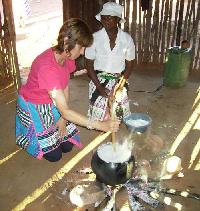 home with flushing toilet and
running hot water! I was soon to learn that this is not
the norm for everybody. Many of Rosemary’s neighbours
live in wooden shacks, (very like our garden shed!) or
round mud huts with thatched roofs called rondavels. The
drop toilet is in the garden and water comes from a
stand pipe on the street corner. Some have electricity!
They cook on an open fire outside or in the middle of
the rondavel.
home with flushing toilet and
running hot water! I was soon to learn that this is not
the norm for everybody. Many of Rosemary’s neighbours
live in wooden shacks, (very like our garden shed!) or
round mud huts with thatched roofs called rondavels. The
drop toilet is in the garden and water comes from a
stand pipe on the street corner. Some have electricity!
They cook on an open fire outside or in the middle of
the rondavel.
Our day started early but not bright as
it was still dark at 6am. School started at 7-30am and
finished at 1-30pm. There were two breaks, the longest
one for lunch at 10am, when the children were fed a
basic meal of beans or pap.
Our afternoons were spent visiting
orphan families and other projects in the area. This was
usually after a visit to Thohayandou for a bite to eat
at the Wimpey! Thohayandou was the closest town about
half an hour away by car, where we could find a fairly
good range of shops and an interesting
market.
The day ended back with our families. I
often went to bed between 8 and 9 pm as by 6pm it was
dark. My internal clock was completely messed up for
most of the three weeks I was away.
Helen and I spent most of our time in
three primary schools, Ganyane school, where our host
families worked and two others. It was soon apparent
that most lessons involved chalk and talk with children
repeating everything they heard. There was very little
of interest on the walls and no P.E, art, drama or
creativity of any kind. All the staff, however, were so
open and willing to try new ideas and
methods.
At Ganyane we introduced water and sand
play for the Reception and Year 1 children. We led
classes in Circle Time and Numeracy, but always with the
teachers present so that they could translate and also
so that they were learning how to run the classes
themselves. I also helped Linda and Helen run workshops
for the staff on creative writing
and assessment. When looking around the schools we found
it almost impossible to find any story books. Comparing
that with the library and shelves of books in our
schools was very sad. I was amazed that the children
learnt to read at all and discovered that the skill was
only thought useful for gaining knowledge and
communicating – not really for enjoyment at all. We
encouraged them to try and spend some of their school
budget on story books, but I know that I will be sending
a few out with the next volunteers that go to help
encourage the staff.
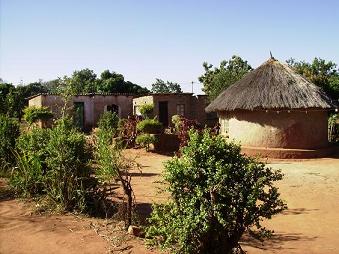
I was very pleased to be able to take a
guitar out to S. Africa with me. I spent several
evenings teaching the two youngest boys in Rosemary’s
home and Donald and Priscilla, Helen and Jo’s hosts. I
was able to teach them the basic skills needed to
continue learning themselves as the guitar stayed with
them and hopefully will be used in school. The children
loved it! I think I will have to send some music along
with the story books.
I spent some time along with Helen
making interesting displays for several classrooms. It
was amazing how our efforts seemed to motivate them into
having a go themselves. I even saw some of the
children’s work go up!
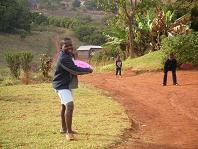 The attitude
towards children was interesting. There was a definite hierarchy in the
respect due to individuals and the children came fairly well
down. It was not unusual to find a child
as young as five or six carrying a very heavy
container of water home from the stand pipe, but saying
this, the children seemed very happy, lively and cheerful, always
keen to say, ‘Hello’.
The attitude
towards children was interesting. There was a definite hierarchy in the
respect due to individuals and the children came fairly well
down. It was not unusual to find a child
as young as five or six carrying a very heavy
container of water home from the stand pipe, but saying
this, the children seemed very happy, lively and cheerful, always
keen to say, ‘Hello’.
I only saw one problem with discipline in
the schools we visited over the three weeks. As there
were about sixty children in many of these classes, that
was a good thing.
The end of the school day saw groups of
children sweeping the floor with branches, another group
washing away the red dust and others picking up litter.
All rubbish was then put on a bonfire – by the
children.
I was glad that we visited a Lutheran
church one week. We could not have been made more
welcome. We were invited to introduce ourselves and say
what we would be doing in the area, to which they
clapped and cheered. Folk took it in turn to stand and
share a song including a song and dance from the teenage
boys. The pastor then got somebody to translate every
bit of his sermon for us.
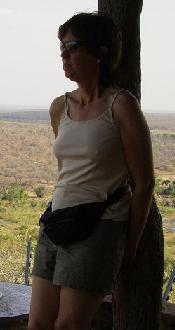 There is so much more I could tell
you but I think I will end by inviting you to look at
the project on the internet. The address is www.mashudu.org
and there will soon be up-to-date photos to see. The aim
of the Mashudu Project is to resource and encourage the
local people in ways that will help them improve their
lives and their facilities, not as we see fit but in
ways that they want to move.
There is so much more I could tell
you but I think I will end by inviting you to look at
the project on the internet. The address is www.mashudu.org
and there will soon be up-to-date photos to see. The aim
of the Mashudu Project is to resource and encourage the
local people in ways that will help them improve their
lives and their facilities, not as we see fit but in
ways that they want to move.
Donations for the project were spent on
mealie flour, bars of soap and loaves of bread, (for 52
orphan families in the village), training for Youth
workers, school materials, some clothing and the Mashudu
Project Guitar. Many thanks to all, who donated to the
project or sponsored me. Ndo Livhuwa! (Thank
you)
Wendy/Thama
Hatch.

